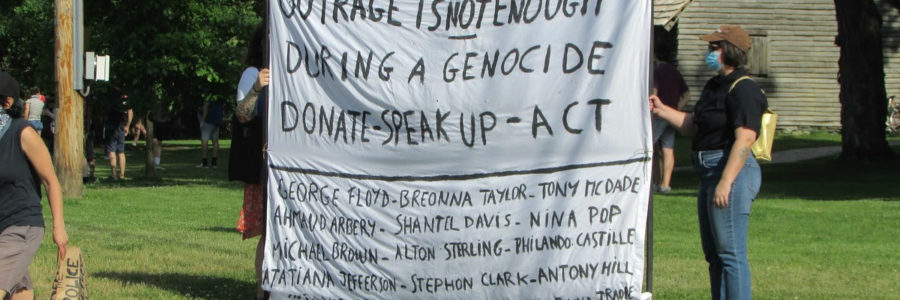
Black Lives Matter
Hello all,
When Ned sent out the call for contributions to class notes, it occurred to me that there’s a lot more to talk about this time around beyond simply catching up with personal news, which I’m always glad to read. I suggested to Ned that most of us could write pages and pages about the horrors of racial injustice that have come back to haunt us all, but he and I agreed that that’s way beyond what could be jammed into class notes. So I said to him that I thought we should exchange our varying takes about what the recent events and the public responses to them mean to us, and what we perceive that this country can do, finally, to stamp out this blight, and perhaps what Nobles can do to participate meaningfully beyond simply stating what it stands for and against. Here’s a step in that direction.
It’s beyond shocking that we’ve waited so long to really face, thanks only to a video camera or two that happened to have been present when one life after another was casually snuffed out, how hard it is for a black person to live and thrive, the same way we privileged white people do, when simply driving while black, or walking while black, or breathing while black in the wrong place at the wrong time, risks one’s life, and when living in the polluted part of town, with inadequate access to health care and a decent education means perpetually facing drastically lower income and life expectancy than most of us enjoy. If we’re honest we have to acknowledge that it’s impossible to feel on a deep level how hard the daily struggle a black person faces. (Jimmy Kimmel gave a very provocative monologue about that recently.)
Most of us have recognized the inequities and have expressed horror and sympathy when other examples of brutality and deprivation of basic needs have surfaced in the news, and then, when the news cycle turned elsewhere, frankly lost focus and turned our own attention elsewhere. Perhaps the current administration’s quintessentially cynical, defensive response to the recent protests is a good thing if it makes us all angry enough and embarrassed enough by our country’s failure to live up to its highest principles to actually pay attention and do something constructive.
So I would like to hear what you all think about what can actually be done during the next year, both through personal efforts you may be planning and by Nobles, to finally set the ship of state permanently on the right course with regard to racial justice. I’ve read about dozens of ideas but confess to indecision about where to put the energy. Certainly voting rights efforts have to be way high on the list, but I haven’t yet found a good venue to dig in and contribute with in person lobbying and legal efforts, other than to send dollars to Common Cause and other voting rights groups.
As for what Nobles can do, I’d like to learn a lot about what the school has accomplished to increase minority enrollment and financial support so far, and how it plans to respond to this crisis and boost its efforts in the future.
Where does it stand in relation to other ISL schools around Boston? Plucking a few deserving students from minority communities and giving them the platform to succeed is certainly a good thing, and of course is many light years away beyond where the school was when we attended.
But how does that effort jibe with the acute need to radically boost the resources that all Boston public schools need in order to raise all the boats?
Would doubling or tripling the amount of scholarships available, while cutting back on one or more optional offerings, make a difference?
And as long as we’re on the topic, what’s the role of private education for the few in the future, when it’s so easy now for cynical bloggers to flood the internet with pure , unadulterated crap and manipulate a vast number of voters who never received enough education to think critically and distill facts from fiction?
Enough of this rant for now, but I do hope we can talk back and forth and learn from the conversation.
Best to all,
Mike

